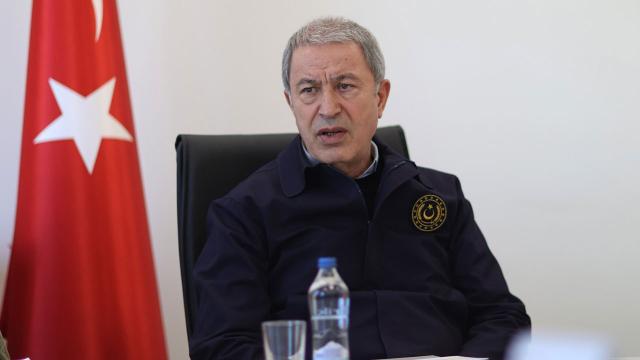Turkish Defense Minister Hulusi Akar has said the deployment of Turkish troops in Syria and Iraq made it difficult for the military to take part in search and rescue efforts in the aftermath of two powerful earthquakes that struck Turkey earlier this month.
Following the disaster, which has so far claimed the lives of more than 45,000 people, Turkish President Recep Tayyip Erdoğan and his ruling Justice and Development Party (AKP) were accused of poor performance in coordinating search and rescue efforts, mainly for being late to mobilize enough manpower, especially the military, which resulted in civilians trying to pull their loved ones from under the rubble themselves.
Akar, who previously denied the claims, saying the ministry and the Turkish Armed Forces (TSK) had done whatever was necessary to help people from the first moments after the quakes, on Tuesday told Hürriyet daily columnist Abdülkadir Selvi that it’s not right for outsiders to pass judgment on military’s response.
“The TSK has joined [search and rescue efforts] in the [disaster] area, in places determined by [Turkey’s Disaster and Emergency Management Agency] AFAD since the first moments after the earthquake, and it continues to do so. … Who will protect the border [and] who will stay in Syria? Were we to withdraw [soldiers] from Syria or … Iraq?” Akar said.
The People’s Liberation Party (HKP), a left-wing populist political party in Turkey, last week filed a criminal complaint against Erdoğan, Akar and Interior Minister Süleyman Soylu due to claims made by veteran journalist Memduh Bayraktaroğlu that the president prevented the military from joining in search and rescue efforts in the aftermath of the quake.
Many say the absence of the TSK led to a higher death toll since flattened buildings were left unattended for days due to the shortage of search and rescue teams and a lack of coordination.
Some small military units were later allowed to join in the efforts.
In 2010 Turkey revoked the so-called Protocol on Security, Public Order and Assistance (EMASYA), which was signed by the Turkish General Staff and the Ministry of Interior in 1997, authorizing the TSK to intervene in the event of a natural disaster without waiting for a request from a governor’s office.
The TSK now requires authorization from the government to act in cases of natural disasters.
It had stepped in in the aftermath of the Marmara earthquake in 1999, which claimed the lives of more than 17,000 people, in accordance with the authorization granted to it by the EMASYA protocol.

